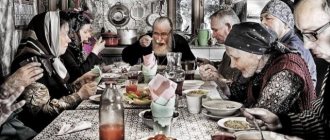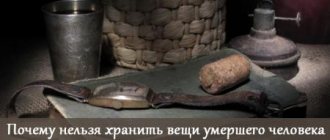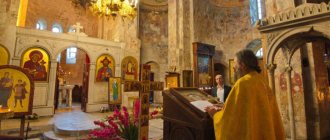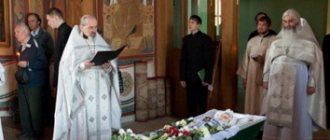Next time the day after the funeral and the funeral dinner, it is still difficult to come to your senses and get used to the idea that the family has become smaller by one whole life. But you need to muster all your willpower to settle all the formalities with inheritance, social status, etc. and how justice should be paid to the memory of the deceased.
Double monument.
There are many traditions in the Orthodox faith that are unquestioningly observed by the majority of people of the older generation. Instilled from time immemorial, prejudices about the afterlife and the wandering soul after death, coupled with the fear of being condemned for ignoring pseudo-religious customs after a funeral, are sometimes taken to extremes.
In particular, covering mirrors, prohibiting watching TV and cleaning the apartment have nothing to do with the teachings of Jesus Christ. Whether you adhere to it or not is your own business. However, there are rational and ethical points that it is better not to ignore, so as not to desecrate the memory of the deceased in a private or public sense. Knowing and understanding the main Orthodox canons and historical traditions is equal to correct behavior in mourning .
Those who are experiencing such a severe loss for the first time will have to figure out what to do after the funeral , what is necessary, what is not necessary, and is extremely undesirable.
Death is a continuation of life
In man, two natures are combined: material (body) and spiritual (soul and spirit). As long as these two principles are in unity and interconnection, a person lives. But everyone’s earthly life sooner or later ends in death (separation of the soul from the body). So the anniversary of death and the prayers associated with it are relevant for everyone.
Death befalls anyone, regardless of nationality, place of residence, social status in society, or material well-being. This is a consequence of the fall of the first people (Genesis 2:17). Man was originally created for immortal life. But the violation of God’s commandment about the forbidden fruit was a consequence of a proud desire for independence from the Creator. This was a manifestation of the inner desire to be like a god.
“In the day that you eat of them, your eyes will be opened, and you will be like gods, knowing good and evil” (Genesis 3:5).
Prayer for the departed
Man's alienation from God has deprived him of God's grace. To prevent man from remaining in this state forever, death entered the world.
“The man suffered death, but even in this case God showed him a great benefit, precisely by not leaving him to remain in sin forever. God expelled man from paradise, as if into exile, so that man, within a certain time, would cleanse his sin and, admonished by punishment, be returned to paradise again. If a defect is discovered in a vessel just made, it is refilled or remade so that it becomes new and whole; the same thing happens to a person in death. For this reason, he is crushed by its power, so that during the resurrection he may appear healthy, that is, pure, righteous and immortal” (St. Theophilus of Antioch, 2nd century).
How to set the table
Table setting for funerals is standard. The only difference is to put an even number of dishes on the table. Forks for mourning dates are usually excluded. Such a moment in time remains at the discretion of the family of the deceased.
Dishes, in addition to those required at the funeral table, are prepared in accordance with the preferences of the deceased. You can add mourning ribbons to the interior and light candles.
For Orthodox Christians, bless the kutia in church. Eliminate alcohol, stick to fasting and fasting days - use them as a starting point when creating a menu. Pay more attention not to eating, but to prayers for the deceased.
Death as a transition to eternity
After death, the human body undergoes decay and destruction. The soul, as Orthodoxy teaches, is immortal.
“If a person dies, this does not mean that his soul ceases to exist. The body is destroyed, but the soul is immortal. She is alive, although she does not live with us, she lives a different life, just as the saints live a different life” (St. Luke of Crimea, 1877-1961).
Depending on the spiritual quality of life lived on earth, the fate of the soul in the world is determined. She either finds heaven by being with the Creator and all the saints. Or he ends up in hell, where he is tortured. Moreover, the suffering of the soul does not consist of physical pain like “frying in a frying pan.” This is a state of distance from God.
“Just as the blind, who do not see the shining sun, although completely illuminated from all sides by it, are nevertheless outside the light, being removed from it by sense and sight. So the Divine light of the Trinity is in “everything.” But sinners, imprisoned in darkness, and among him will not see him and have absolutely no divine knowledge and feeling, but scorched and condemned by their own conscience, they will have unspeakable torment and inexpressible sorrow forever” (Rev. Simeon the New Theologian).
Death represents the transition to eternity. This is a great secret. Man's earthly path is only a preparation for eternal life. Therefore, death is not the end, but a continuation of this life.
“Death is terrible and terrible for those who do not know the highest wisdom, for those who do not know the afterlife, for those who consider death the destruction of being, of course, for such, death is terrible, its very name is murderous. But we, who by the grace of God have seen His unknown and secret wisdom, and who consider death to be a migration, should not tremble, but rejoice and be complacent, because we leave this corruptible life and move on to another life, endless and incomparably better” (St. John Chrysostom, 347-407 ).
Order of conduct
When remembering the deceased, it is traditional to gather around the table , but this does not mean that the wake is a reason to eat. And even more so at a wake, heavy libations are inappropriate and undesirable.
Some Orthodox canons go against not only the established traditions of commemorations of Soviet and post-Soviet times, but also the echoes of centuries-old paganism that have taken root in the popular consciousness.
Alcohol
In particular, the Russian Orthodox Church does not accept alcohol at funerals . On the other hand, in the “secular” tradition it is customary to place a glass of vodka covered with a slice of black bread in the place of the deceased at the table (or on his grave).
Candle in front of photo
The same applies to candles in front of a portrait of the deceased : separately, both a candle and a portrait are quite appropriate, but lighting a candle or lamp in front of a portrait of a mere mortal is prohibited by the church canon: candles are placed only in front of the face of saints . You can buy an icon of the patron saint of the deceased and light a candle in front of it, this will be more correct.
Unoccupied seat at the table
The tradition also presupposes a certain seating arrangement at the table , when one empty seat is left, next to which the closest relatives of the deceased sit. It is also natural not to dress brightly for a wake and not to behave noisily and cheerfully at them.
The fate of the human soul after death
After the death of a person, the immortal soul lives separately from the body. The final decision about her afterlife, according to the teachings of the Church, will be made at the Last Judgment. But on the 40th day after death, a private trial (preliminary) takes place.
“On the 40th day after death, the location of the soul in eternity is determined until the Last Judgment. This is called "private judgment" when God determines the place where the soul will be. The prayers of the living for a departed person are especially needed if unrepentant sins are such that there is no room in the soul for a bright eternity. Then we can actively help the newly deceased. That is, prayer, alms in memory of him, good deeds, participation in the sacraments.
A private trial involves a person meeting with himself. With himself as he was called to be in God’s plan for him. When these horizons of holiness and grace are opened to a person, he becomes ashamed of the way he came to this judgment. For all your falls and passions, baseness and self-justification. For the time lost and the people erased from his heart, whom he was called upon not to reject, but to warm with his love and attention. Demons lay claim to his soul. Angels protect her” (hieromonk Dmitry Pershin).
Visit to the cemetery
During this time, you should definitely visit the cemetery. If weather conditions do not allow (heavy rain, snowstorm), this can be done on another day. You should arrive at the cemetery in the first half of the day.
The grave of the deceased must be monitored. Paint the fence in a timely manner, you can put a small table and bench. Plant flowers, weed out unnecessary weeds that give the grave an unkempt appearance. This is the anniversary of death... How to remember a person? Clean up his grave, light candles in special cups, lay fresh flowers.
According to Christian traditions, the synod in the 19th century banned wreaths with inscriptions made from fake flowers. Such layings distract from prayers for the soul of the deceased.
You can bring tea, alcohol, pies, and sweets to the grave. To modestly remember the deceased, pour the remains of alcohol on the grave, sprinkle crumbs - this is a symbol of the presence of the deceased next to the living. Many families adhere to this pagan tradition at funerals.
In Christianity, it is forbidden to bring anything to the grave. Only with fresh flowers and prayers should the deceased be remembered.
The dead await the Last Judgment
In anticipation of the general resurrection and God's final judgment, the human soul finds the bliss and pleasure of heaven or is subjected to torment in hell. Moreover, the Church recognizes the existence of heaven and hell as real. However, they are not material, but spiritual in nature.
“Since passions are not natural to the soul, but enter into it through our love of sin, then, because of this very unnaturalness, they will torment and burn the soul. Passions: these are the internal thirsts, kindlings, lusts of the sin-loving soul; If you satisfy them, they will remain silent for a while, and then again, with even greater force, they demand satisfaction for themselves and do not give rest until they receive it. In the same world there will be nothing to satisfy them, because all objects of passion are earthly objects. They themselves will remain in the soul and will demand satisfaction for themselves, and since there is nothing to satisfy them, the thirst will become stronger and more tormenting. And the longer the soul lives, the more it will languish and be tormented by unsatisfied passions; this incessant torment will continue to grow and grow, and there will be no end to this growth and intensification. This is hell! Envy is a worm, anger and rage are fire, hatred is gnashing of teeth, lust is pitch darkness” (St. Theophan the Recluse).
Funeral dinner
According to Orthodox canons, dishes for funerals must be lean and blessed in the church. Townspeople rarely observe these rules , limiting themselves to serving a few traditional Orthodox funeral dishes.
- First of all, this is kutia - a sweet, crumbly cereal porridge made from rice or millet with raisins, seasoned with honey.
- Pancakes without filling and jelly are just as traditional .
Kutya is served on the table first and is offered, first of all, to the closest relatives of the deceased. In addition, it is appropriate to prepare simple and classic dishes for a funeral service - pies with different fillings, fresh vegetables, boiled or baked potatoes, hard-boiled eggs.
The funeral table does not involve culinary delights . The remains of the treat are traditionally divided among the diverging guests.
More information about the memorial table here:
Table at the wake
Death anniversary: why pray for the deceased
Alleviation of the afterlife fate of the soul before the Last Judgment is possible through the prayers of living people. Prayer is the connection between the living and the dead. “God is not the God of the dead, but of the living, for with Him all are alive” (Gospel of Luke 20:38).
“Just like when we visit prisoners, we bring them soft drinks and the like and thereby alleviate their suffering. We also alleviate the suffering of the deceased with prayers and alms that we perform for the repose of their souls. The prayers of the living for the departed and the services performed for their repose are the last opportunity to receive the help that God gives to the departed - before the Second Coming. After the final Judgment, they will no longer have the opportunity to receive help” (St. Paisius the Svyatogorets).
For deceased people, help and support for those currently living on earth is very important. And these are not expensive tombstones or death anniversaries with lavish wakes. They need heartfelt prayer for the repose of their souls, for the forgiveness of sins.
“They come to their senses and ask for help, but they can no longer help themselves. Those who are in hell would like only one thing from Christ: that He would give them five minutes of earthly life to repent. We who live on earth have a reserve of time for repentance. And the unfortunate deceased can no longer improve their situation themselves, but expect help from us. Therefore, we are obliged to help them with our prayer” (St. Paisius the Svyatogorets).
Only the prayers of believers can change the fate of the deceased for the better. According to the testimony of the Holy Fathers, there are many known cases of sinners begging from hell.
In the Alphabetical Patericon (4th-5th century) there is a story about Saint Macarius of Egypt.
“One day, while walking through the desert, he saw a skull lying on the sand and, touching it with a stick, asked: “Who are you?” The skull answered: “I was the priest of the idolaters who lived in this place. And you are Abba Macarius, who has the Holy Spirit within you. When, having mercy on those who are in eternal torment, you pray for them, they receive some relief."
Funeral in a cafe
To eliminate the bulk purchase of products, cooking, table setting and subsequent tidying, you can order a small room in a cafe. So that the anniversary of death passes in a calm atmosphere. The cafe staff will help you remember what to order. Their menu is not much different from home.
The cafe staff should be notified in advance that guests will gather for the funeral. The administrator will try to keep overly cheerful visitors as far as possible from the relatives of the deceased (if we are talking about a common room).
It is usually customary to book a small banquet hall for holidays. Then the festive neighbors will not interfere with the quiet mood of the death anniversary.
If you don’t fancy a cafe, but want a cozy, homely atmosphere, you can order lunch at home. Agree on the menu in advance, set a time and delivery address.
Anniversary of death
The Holy Church performs funeral services (Liturgies, memorial services) several times a year. But relatives can privately pray especially on memorial days for the deceased. These include the 3rd, 9th, 40th day, death anniversary.
“Perform the thirds of those who have fallen asleep in psalms, readings and prayers for the sake of the Risen One on the third day, and the tithes in remembrance of those who have fallen asleep here, and the fortieths according to the ancient model, for this is how the people of Israel mourned Moses, and the anniversary in memory of the deceased. And let them distribute from his property to the poor in remembrance of him” (Book of Apostolic Constitutions, 8:42).
It is common for a person to experience a dulling of grief over the years. But this is not a reason not to remember the dead even after many years have passed from the date of death. For Christians there should always be a “day of remembrance”. Therefore, within the family circle, they pray for deceased relatives every day.
“Orthodox Christians do not part with their loved ones even after their death. Every day, remembering the departed in our morning and evening prayers, we fit them into the circle of our lives. It’s as if they suddenly left for a distant land, and we just haven’t seen them for a long time. But at the same time, we hope, we really believe that someday we will definitely meet them. With those whom we love so much, and who love us so much... Because God loves us all” (Priest Andrei Tkachenko).
The history of the days of remembrance
A wake (or commemoration, remembrance) is a ritual in memory of a deceased person. Usually the funeral is held by relatives; if there are none, close people and friends.
The tradition of commemoration arose in connection with Christian teaching. Every religion has its own rituals for remembering people. Adapted folk consciousness often combines several beliefs into one ritual.
Christian traditions are fundamental in Russia. Nevertheless, according to Orthodox rules (with funeral commemorations and prayers), only people who have undergone the rite of baptism are remembered. The exceptions are suicides, unbaptized, non-Orthodox, heretics - the church does not pray for them.
Death anniversary: how to properly remember the deceased
How to remember a deceased person on the anniversary of his death? This question naturally arises before close relatives. Death anniversaries and memorials should not be reduced to the performance of established rituals. Visiting a cemetery or setting a table is, of course, important. But the most important thing is prayer, asking the Lord for mercy for the Kingdom of Heaven. Prayer can be private, at home. But it is better to order a memorial in a church or monastery (consult with the priest).
What do they order in the temple on the anniversary of death? On this day, you should order a commemoration in the church at the Divine Liturgy. This is the most important and important thing for the souls of already dead Christians. During the preparatory part (Proskomedia), the priest removes particles from the prosphora. At the same time, living and deceased Christians for whom notes were submitted are remembered in prayers. The removed particles are dropped into the Chalice with the Blood of Christ for Communion. The priest pronounces the prayer: “Wash away, O Lord, the sins of those remembered here by Thy Honest Blood, by the prayers of Thy saints.”
“The commemoration of the living and the dead at the proskomedia and after the consecration of the Gifts, although unspoken, in its meaning, strength and effectiveness cannot be compared with any other prayerful commemorations: health prayers, memorial services for the dead or any other pious deeds in memory of the living and dead" (St. Afanasy Kovrovsky, 1887-1962).
The anniversary of death is a good reason to honor the memory of the deceased and prayerfully help him. A memorial service (special memorial service) can be ordered on this day. It can be performed not only in the temple, but also in the cemetery near the grave. To do this, you should contact the church in advance and submit a special note with the name of the deceased.
You can also give alms for the repose of the soul of the deceased. This is a kind of request to other people to pray for the deceased. Moreover, the anniversary of death is not the only reason for almsgiving - it must be done constantly.
Who should you invite?
A commemoration, the anniversary of death, takes place in a close family circle. How to remember and who to call is discussed by relatives in advance. It is customary to invite only those whom you want to see to the godina.
Unwanted visitors may unexpectedly appear on the anniversary of death. The family of the deceased must make a decision - to leave the unwanted guest at the funeral dinner or not to invite him to the table at all. The anniversary of death is an event only for those closest to you.
You shouldn't have a crowded gathering. A funeral date, the memory of the deceased is not a reason for a noisy party. A modest family dinner, warm memories of the deceased - this is how the anniversary of death passes. How to commemorate is decided by the closest relatives of the deceased. A leisurely, calm atmosphere, quiet music, photographs of the deceased are a worthy way to honor the memory.
Prayer for the departed
Remember, O Lord our God, in faith and hope the life of your eternally departed (before the 40th day from the day of death - newly reposed) Thy servant (Thy deceased servant, Thy departed servant) (name), and as You are Good and Lover of Mankind, forgiving sins and consuming untruths , weaken, forsake, and forgive all his (her) voluntary and involuntary sins, raising him (up) at Your holy second coming to the communion of Your eternal blessings, for the sake of which there is only faith in You, the true God and Lover of mankind; for Thou art the resurrection and the life and the rest of Thy servant (name), Christ our God, and to Thee we ascribe glory, with Thy beginningless Father, and with the Most Holy Spirit, now and ever and unto ages of ages, Amen.
Read us conveniently on social networks:
Tags: year after death, year from the date of death, anniversary of death, anniversary of death 1 year, funeral 1 year rules
What to say at a wake
The head of the family traditionally receives the first word at the wake . In the future, the responsibility to monitor the general conversation and gently guide it during the ceremony is assigned to one of the close relatives . A person grieving the loss of a loved one cannot be expected to be able to lead an event and cope with their own feelings.
Find examples of condolences to gently and sincerely express your sympathy for the loss of a loved one.
For such a role, they choose a person who knew the deceased well and is able, in a tense moment, to remember some character trait , a nice habit or an event from life that can be told to those gathered.
The usual rules of a “social party” do not apply to a wake : there is no need to try to fill a pause in the conversation or break the silence with minor remarks on an abstract topic. Silence at a wake is not only normal, but even correct: in silence, everyone remembers the deceased and feels more fully their connection with him.
An obituary is a memory of a person immortalized in text.
How to write an obituary
Funeral speech at a wake
If you want to speak out, stand up, briefly outline how you remember the deceased (naturally, we are talking only about positive traits), what made him a special person in your eyes . If you remember any case when the deceased did a good deed for you personally or for someone abstract or unfamiliar, tell us about it , but do not tell stories in which someone present appears.
Everyone can speak at a wake, but try not to drag out your speech . The speech should be a contribution to the mosaic of collective memory of the deceased, and not a detailed biography or profile.
Read more: Funeral speech at funerals and wakes
Wake today
You may not know absolutely exactly how to “correctly” conduct a wake according to the Orthodox tradition . Don't worry too much about this. Living conditions have changed, opportunities have changed. The main thing in the funeral rite is sincere intention and pure thoughts towards the deceased.
When you do something in memory of the deceased with an open heart, you can't go wrong. Funerals in the secular sense are needed more for the living than for the deceased. This ritual event is designed to ease feelings and accept the new reality of life.
We recommend:
- A beautiful collection of epitaphs and words of sorrow
- Obituaries and pages of memory for family and friends
- Parents' Saturday - day of remembrance of ancestors
Order a memory page
Menu for 1200 rubles per person
| Cold appetizers | ||
| Assorted fresh vegetables | 50 gr. | |
| Herring with potatoes | 50 gr. | |
| Assorted homemade pickles | 50 gr. | |
| Assorted meats | 50 gr. | |
| Kutya | 50 gr. | |
| Pancakes | 2 pcs. | |
How do we work with our clients?
We work with each client in four stages. The first stage is for a person to contact our company. You can call yourself or leave a request for a call on our website. During the first conversation, you can clarify all the details you are interested in. For example, what menu do we offer for funerals 40 days and other dates.
At the second stage, the customer comes to our complex to get acquainted with the halls. In the process, he can choose what suits him. Can also indicate some wishes for textile design. At the third stage, the order is confirmed: the hall is selected and the menu is determined. If you have a larger budget, you can choose a menu for 1,500 rubles per person.
Why choose us?
If you have not yet made your final choice in favor of any institution, then you should definitely find out about our advantages:
The funeral menu is selected in advance upon first contact and approval of the order. An excellent option would be a menu for 1200 rubles per person.
Shifting the date of the funeral
It happens that the memorial day falls on a church holiday, or on weekdays, when it is not possible to leave work in connection with the preparation of everything necessary for the funeral meal. As a result, the question arises: is it possible to postpone the date of commemoration?
The priests believe that the meal can be held earlier or later than the exact date of death. If there are good reasons that prevent you from holding a memorial dinner, you should focus, first of all, on them. However, if there are no compelling reasons to postpone the funeral meal to another day, it is better not to do this, because the afterlife has its own rules. On this day, it is better to focus on good deeds, for example, distributing funeral treats to people in need.
Funerals should not be held during Easter and Holy Week of Lent. These weeks everything is focused on the sacrifice of Jesus Christ, as well as the news of his return to life. Therefore, if the date set aside for the funeral dinner coincides with these periods, it is best to move the funeral meal to the day of Radonitsa - the day when the deceased are remembered.
If Memorial Day falls on the eve of the Christmas holidays, it would be more correct if the commemoration is moved to January 8th. Such an event is taken as a good omen, because the wake is dedicated to the event of birth into an endless life in another world.
The priests also recommend remembering that you should first pray for the deceased. Therefore, the day before the memorial meal, it is recommended to order the Liturgy for the burial of the Soul of the deceased and the Panikhida for the memorial day. And the memorial meal can be postponed to one of the first days off of subsequent anniversaries of death. However, it is not advisable to postpone the wake, organized on the fortieth day after repose, to an early date.











